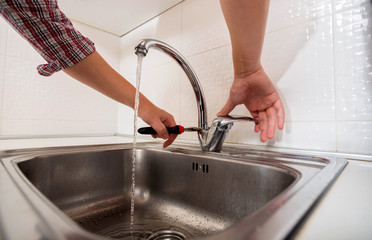
What Does a Plumber Do?
Plumbers install and maintain pipes and fixtures that carry water, gas, or other fluids in homes and businesses. They also inspect and repair clogged drains, faucets, toilets, and other plumbing issues.
Most states require years of training for plumbers to be skilled, both in the technical aspects and the codes that regulate the trade. Obtaining state certification is a great way to boost your career.
A plumber installs and repairs pipes that carry water, gas, and waste from homes and businesses. They also inspect and test plumbing systems to ensure they are working properly.
They may work on both commercial and residential buildings and use blueprints to determine pipe and fixture locations that comply with building codes. They are responsible for staying within a project budget and time schedule.
Plumbers are patient and practical individuals with a strong knowledge of hydraulic systems. They are often able to solve issues quickly and efficiently. They can work alone or collaborate with other construction professionals to ensure that the job is completed correctly.
Some plumbers work on a contract basis and travel extensively for their jobs, often working late into the evening or on weekends. They may have to work in remote areas, such as mountaintops or the ocean, which can be physically demanding.
To become a plumber, you must first complete an apprenticeship or attend a trade school or vocational program accredited by a national trade union. You must then obtain a license from the local or state government to legally practice in your area.
You may also choose to specialize in a particular plumbing system, such as sanitation or air conditioning. This would allow you to focus on your strengths and earn more money than an entry-level plumber.
Your responsibilities as a plumber include installing and repairing toilets, sinks, faucets, and other fixtures in homes, hospitals, and manufacturing plants. You can also install water lines and sewage systems in schools, offices, hotels, and other commercial or industrial buildings.
As a plumber, you must prioritize safety and be physically fit to perform your job duties. You might have to work at a high elevation or in cramped spaces, which requires good coordination and flexibility. You must also have the ability to communicate clearly and effectively, especially when dealing with clients.
Plumbing is a highly practical industry that requires specialized training. Plumbers receive classroom instruction and on-the-job training in a variety of fields, including water and gas piping, heating, air conditioning, waste management, and industrial plumbing. They also read blueprints and develop expert knowledge about building codes.
Investing the time to become a licensed plumber offers a pathway to a well-paying career with a solid demand outlook. There are a number of ways to get your foot in the door, from apprenticeship programs offered through trade unions to specialized classes and trade school degree programs.
Most plumbers begin their careers as apprentices. They complete four to five years of formal training under a master plumber, working on jobs under supervision. They attend classes in basic physics, chemistry, workplace safety, and building codes.
After gaining experience, apprentices can apply for a journeyman plumber’s license. This license can lead to a master plumber license, which can give you more autonomy and increased pay.
A master plumber can install and repair water piping systems, as well as inspect and maintain septic and sewer lines. They may also supervise teams of apprentices.
Once you have gained enough experience, you can start your own business as an independent contractor. However, you will need to acquire a state-issued business license, workers’ compensation insurance, and liability insurance.
The education and training you need to get a job as a plumber depend on where you live and the regulations in your area. In New York, for instance, it can take four to five years to become a journeyman plumber and another two to 10 years to gain master plumber status.
As a plumber, you can choose to work as an independent contractor or for a specialized company. Regardless of where you work, your duties include repairing and maintaining water, sewer, and gas piping systems in homes and businesses. You can also educate customers on how to keep their systems in good condition, which can help you earn repeat business.
If you’re interested in becoming a plumber, you can attend an accredited college or trade school to obtain the training you need. These schools teach students about drafting and reading blueprints, as well as physics and chemistry. They also provide extensive on-the-job training to learn how to properly use equipment, identify materials and tools, and conduct inspections for compliance with building codes.


